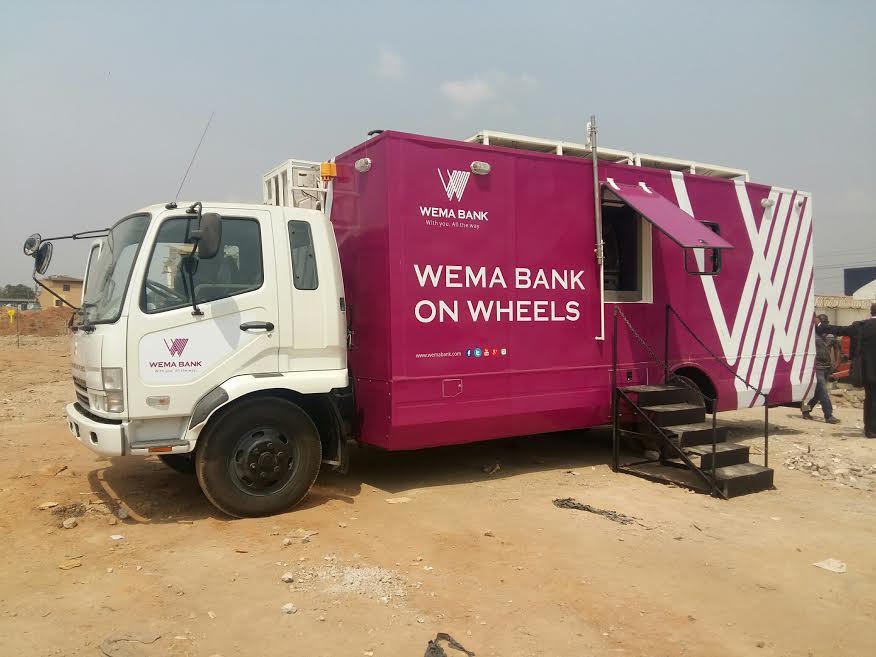Banking
Wema Bank Financial Metrics Remain Weak—Fitch

**Affirms Bank at ‘B-‘ With Outlook Stable
By Modupe Gbadeyanka
Renowned global rating company, Fitch Ratings, has disclosed that the financial metrics of Nigeria-based Wema Bank has remained weak despite meeting its strategic goals over the last three years.
Fitch made this disclosure in a statement last week when it announced affirming the lender’s Long-Term Issuer Default Rating (IDR) at ‘B-‘ and National Long-Term Rating at ‘BBB-(nga)’ with the outlook stable.
The rating agency noted that Wema Bank’s core earnings remain low but are improving gradually, adding that its net interest income has benefited from Nigeria’s high-interest-rate environment (the policy rate is 14%) despite continuing pressure on the cost of funding.
The latter, it said, reflects the limited franchise and weak customer deposit mix.
Fitch said one of the main constraints on Wema Bank’s profitability continues to be its very high cost base (the cost/income ratio was 90% in 2016). Loan impairment charges are increasing but remain manageable.
On Wema Bank’s IDRs, the rating firm noted that they are driven by its standalone creditworthiness as defined by its Viability Rating (VR). The VR is constrained by challenging operating conditions in Nigeria, the bank’s modest franchise (1% market share), as well as weak earnings and profitability and tight capitalisation.
It said these factors are counterbalanced by Wema Bank’s coherent strategy, strong management team, good impaired loan ratio and low levels of foreign currency (FC) loans.
The business model, underpinned by the roll-out of sophisticated delivery channels, is improving and the bank is in an early stage of growth focussing on mid-market corporates and retail segments, it said.
However, Fitch said Wema Bank’s low impaired loan ratio (end-9M17: 1.4%) partly reflects its below-average exposure to the oil sector and a smaller proportion of FC loans. The bank’s non-performing loan ratio (based on prudential requirements/90 days overdue) is higher (end-9M17: 3.5%) but still compares favourably with peers.
“Our assessment of asset quality also considers Wema’s very high credit concentrations by industry and single borrower,” the statement released in London on Wednesday, February 7, 2018, disclosed.
It added that Wema Bank’s capital ratios are tight in the context of the operating environment and regulatory requirements.
The bank reported a total capital adequacy ratio (CAR) of 12.4% at end-9M17, which is a modest buffer over its regulatory minimum of 10% and is sensitive to even modest shocks. Pressure on the CAR partly comes from low internal capital generation.
Funding is primarily reliant on costly savings and term deposits given Wema Bank’s limited retail franchise. The bank is diversifying its funding sources by tapping market funding. Positively, Wema Bank has a lower proportion of FC assets and liabilities than peers and is less affected by FC liquidity pressures in the system, it said.
“Wema Bank’s National Ratings reflect Fitch’s opinion of its standalone creditworthiness relative to the best credits in the country. The National Long- and Short-Term Ratings of ‘BBB-(nga)’ and ‘F3(nga)’ take into account Wema Bank’s overall risk profile relative to other Nigerian banks, including its limited franchise and weak financial metrics,” the statement said.
“Fitch believes that sovereign support to Nigerian banks cannot be relied on given Nigeria’s (B+/Negative) weak ability to provide support, particularly in foreign currency.
“In addition, there are no clear messages from the authorities regarding their willingness to support the banking system.
“Therefore, the Support Rating Floor of all Nigerian banks is ‘No Floor’ and all Support Ratings are ‘5’. This reflects our view that senior creditors cannot rely on receiving full and timely extraordinary support from the Nigerian sovereign if any of the banks become non-viable,” the statement said.
Concluding, it said Wema Bank’s IDRs are sensitive to rating action on its VR. This would most likely be triggered by a further decline in its capital ratios. A material deterioration in asset quality and/or a pronounced instability in Wema Bank’s funding profile could also put negative pressure on the bank’s VR.
Banking
Public Offer: Sterling Holdco Allots 13.812 billion Shares to 18,276 Shareholders

By Aduragbemi Omiyale
Sterling Financial Holdings Company Plc has allotted shares from its public offer of 2025 to investors with valid applications.
The allotment follows the earlier receipt of final approval from the Central Bank of Nigeria (CBN) and the recent clearance by the Securities and Exchange Commission (SEC).
In September 2025, the financial institution offered for sale about 12,581,000,000 ordinary shares of 50 kobo each at N7.00 per share in public offer.
However, the exercise received wide participation from the investing public, with the company getting 18,280 applications for 16,839,524,401 ordinary shares valued at approximately N117.88 billion.
Following a thorough verification process, valid applications were received from 18,276 shareholders for a total of 13,812,239,000 ordinary shares, representing a subscription level of 109.79 per cent and reflecting sustained confidence in Sterling Holdco’s strategic direction, governance, and long-term growth prospects.
The firm approached the capital market for additional funds for the recapitalisation of its two flagship subsidiaries, Sterling Bank and The Alternative Bank.
The capital injection will support the commencement of full operations and contribute to the group’s revenue diversification objectives.
In line with the guidelines set out in the offer prospectus, Sterling Holdco confirmed that all valid applications will be allotted in full. Every investor who complied with the terms of the offer will receive all the shares for which they applied.
A very small number of applications were not processed or were partially rejected due to non-compliance with the offer terms, including duplicate payments and failure to meet the minimum subscription requirement of 1,000 units or its multiples, as stipulated in the offer documents.
The group ensures a seamless post-offer process, with refunds for excess or rejected applications, along with applicable interest, to be remitted via Real Time Gross Settlement or NIBSS Electronic Funds Transfer directly to the bank accounts detailed in the application forms.
Simultaneously, the electronic allotment of shares has be credited to successful shareholders’ accounts with the Central Securities Clearing System (CSCS) on February 17, and for applicants who do not currently have CSCS accounts, their allotted shares will be temporarily held in a registrar-managed pool account pending the submission of their completed account opening documentation to Pace Registrars Limited, after which the shares will be transferred to their personal CSCS accounts.
Banking
CBN Governor Seeks Coordinated Digital Payment Reforms

By Modupe Gbadeyanka
To drive inclusive growth, strengthen financial stability, and deepen global financial integration across developing economies, there must be coordinated reforms in digital cross-border payments.
This was the submission of the Governor of the Central Bank of Nigeria (CBN), Mr Olayemi Cardoso, at the G‑24 Technical Group Meetings in Abuja on Thursday, February 19, 2026.
According to him, high remittance costs, settlement delays, fragmented systems, and heavy compliance burdens still limit the participation of households and Micro, Small and Medium Enterprises (MSMEs) in global trade.
The central banker emphasised that efficient payment systems are essential for economic inclusion, highlighting that global remittance corridors still incur average costs above 6 per cent, with settlement delays of several days, excluding millions from modern economic activity.
Mr Cardoso cautioned that while digital payments present significant opportunities, they also carry risks such as currency substitution, weakened monetary transmission, increased FX volatility, capital-flow pressures, and regulatory fragmentation.
The G-24 TGM 2026, themed Mobilising finance for sustainable, inclusive, and job-rich transformation, convened global financial stakeholders to advance the modernisation of finance in support of emerging and developing economies.
The CBN chief reaffirmed Nigeria’s commitment to working with G-24 members, the IMF, the World Bank Group, and other partners to build a more inclusive, resilient, and development-oriented global financial architecture.
“We have strengthened our AML/CFT frameworks in line with FATF guidelines, requiring strict dual-screening of cross-border transactions to mitigate risks.
“To deepen regional integration, the CBN introduced simplified KYC/AML requirements for low-value cross-border transactions to encourage broader participation in PAPSS, easing processes for Nigerian SMEs and enabling faster intra-African trade payments.
“We have also embraced fintech innovation through our Regulatory Sandbox, allowing payment-focused fintechs to test secure, instant cross-border solutions under close CBN supervision,” he disclosed.

Banking
Unity Bank, Providus Bank Merger Awaits Final Court Approval

By Modupe Gbadeyanka
The merger and business combination between Unity Bank Plc and Providus Bank Limited remains firmly on course, a statement from one of the parties disclosed.
According to Unity Bank, there is no iota of truth in reports in certain sections of the media suggesting that the merger process had stalled, as the transaction remains firmly on track.
It was disclosed that the necessary regulatory steps have been completed, but only a few other steps to finalise the transaction, especially the final court sanction.
There had been speculations that both lenders may not meet the new minimum capital requirement of the Central Bank of Nigeria (CBN) before the March 31, 2026, deadline.
However, it was noted that the combined capital base of Unity Bank and Providus Bank exceeds N200 billion, which is the minimum requirement to retain a national banking licence under the CBN’s recapitalisation framework.
When completed, the Unity-Providus merger is expected to deliver a stronger, more competitive, and customer-centric financial institution — one with the scale, innovation, and reach to redefine the retail and SME banking landscape in Nigeria.
“The merger with Providus Bank significantly enhances our capital base, operational capacity, and strategic positioning.
“We are confident that the combined institution will be better equipped to support economic growth and deliver innovative financial solutions across Nigeria,” the chief executive of Unity Bank, Mr Ebenezer Kolawole, stated.
Recall that a few months ago, shareholders authorised the merger between the two entities at Court-Ordered Meetings. They also adopted the scheme of merger at their respective Extraordinary General Meetings (EGMs) in September 2025,
The central bank also backed the merger, with a pivotal financial accommodation to support the transaction. The merger also received a further boost with a “no objection” nod from the Securities and Exchange Commission (SEC).
The regulatory approvals form part of broader efforts to strengthen the resilience of Nigeria’s banking system, reinforce capital adequacy across the sector, and mitigate potential systemic risks.
The development positions the combined entity among the 21 banks that have satisfied the apex bank’s new capital threshold for national banking operations.
-

 Feature/OPED6 years ago
Feature/OPED6 years agoDavos was Different this year
-
Travel/Tourism10 years ago
Lagos Seals Western Lodge Hotel In Ikorodu
-

 Showbiz3 years ago
Showbiz3 years agoEstranged Lover Releases Videos of Empress Njamah Bathing
-

 Banking8 years ago
Banking8 years agoSort Codes of GTBank Branches in Nigeria
-

 Economy3 years ago
Economy3 years agoSubsidy Removal: CNG at N130 Per Litre Cheaper Than Petrol—IPMAN
-

 Banking3 years ago
Banking3 years agoSort Codes of UBA Branches in Nigeria
-

 Banking3 years ago
Banking3 years agoFirst Bank Announces Planned Downtime
-

 Sports3 years ago
Sports3 years agoHighest Paid Nigerian Footballer – How Much Do Nigerian Footballers Earn


















